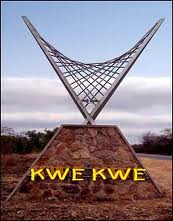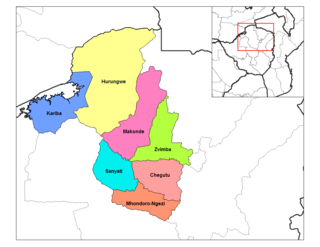
Harare, formerly Salisbury, is the capital and largest city of Zimbabwe. The city proper has an area of 982.3 km2 (379.3 sq mi), a population of 1,849,600 as of the 2022 census and an estimated 2,487,209 people in its metropolitan province. The city is situated in north-eastern Zimbabwe in the country's Mashonaland region. Harare is a metropolitan province which also incorporates the municipalities of Chitungwiza and Epworth. The city sits on a plateau at an elevation of 1,483 metres above sea level, and its climate falls into the subtropical highland category.

Bulawayo is the second largest city in Zimbabwe, and the largest city in the country's Matabeleland region. The city's population is disputed; the 2022 census listed it at 665,940, while the Bulawayo City Council claimed it to be about 1.2 million. Bulawayo covers an area of 546 square kilometres in the western part of the country, along the Matsheumhlope River. Along with the capital Harare, Bulawayo is one of two cities in Zimbabwe that are also provinces.

Southern Africa is the southernmost region of Africa. No definition is agreed upon, but some groupings include the United Nations geoscheme, the intergovernmental Southern African Development Community, and the physical geography definition based on the physical characteristics of the land.

Mutare, formerly known as Umtali until 1982, is the capital and largest city in the province of Manicaland. It is the third most populated in Zimbabwe. Having surpassed Gweru in the 2012 census, with an urban population of 224,802 and approximately 260,567 in the surrounding districts, Mutare adds to the wider metropolitan area a total population of over 500,000 people. Mutare is also the capital of Manicaland Province and the largest city in eastern Zimbabwe.

Zvishavane, formerly known as Shabani, is a mining town in Midlands Province, Zimbabwe. Surrounded by low hills, it lies 97 kilometres (60 mi) west of Masvingo, on the main Bulawayo-Masvingo road. Other roads lead from Zvishavane to Gweru, 121 kilometres (75 mi) north, and Mberengwa, 27 kilometres (17 mi) south-west. It is also on direct rail links to Gweru and Beit Bridge which then link up with Harare and Bulawayo in Zimbabwe and to Maputo in Mozambique, and Pretoria in South Africa. It has a private airport serving the city.
Hwange, originally known as Wankie, is a town in Zimbabwe, located in Hwange District, in Matabeleland North Province, in northwestern Zimbabwe, close to the international borders with Botswana and Zambia. It lies approximately 100 kilometres (62 mi), by road, southeast of Victoria Falls, the nearest large city. The town lies on the railway line from Bulawayo, Zimbabwe's second-largest city, to Victoria Falls. Hwange sits at an elevation of 770 metres (2,530 ft), above sea level.

Francistown is the second-largest city in Botswana, with a population of about 103,417 and 147,122 inhabitants for its agglomeration at the 2022 census. It is located in eastern Botswana, about 400 kilometres (250 mi) north-northeast from the capital, Gaborone. Francistown is located at the confluence of the Tati and Ntshe rivers, and near the Shashe River and 90 kilometres (56 mi) from the international border with Zimbabwe.

Mashonaland is a region in northeastern Zimbabwe. It is home to nearly half of the population of Zimbabwe. The majority of the Mashonaland people are from the Shona tribe while the Zezuru and Korekore dialects are most common. Harare is the largest city followed by Chitungwiza.

Beitbridge is a border town in the province of Matabeleland South, Zimbabwe. The name also refers to the border post and bridge spanning the Limpopo River, which forms the political border between South Africa and Zimbabwe. The border on the South African side of the river is also named Beitbridge.

Kwekwe, formerly known as Que Que, is a city in the Midlands province in central Zimbabwe. The city has a population of 119,863 within the city limits, as of the 2022 census, making it the 7th-largest city in Zimbabwe and the second-most populous city in the Midlands, behind Gweru.

Midlands State University is a government owned university in Zimbabwe. The university has 9 faculties offering a wide variety of courses and many specialist programmes. The university is accredited through the National Council for Higher Education, under the Ministry of Higher and Tertiary Education of Zimbabwe.

Kadoma, formerly known as Gatooma, is a town in Zimbabwe.

Filabusi is a town in the Matabeleland South Province of Zimbabwe. The town is the administrative capital of Insiza District and a service centre for the surrounding mining and farming areas.
Asa Resources Group is a mining company based in Johannesburg and London. According to the company's website, it is the first African-owned and African-managed business to be listed in the Resources sector of the London Stock Exchange's Alternative Investment Market. Asa was founded in 1987.

Shurugwi, originally known as Selukwe, is a district located in Midlands Province, southern Zimbabwe. 98,315 people live in Shurugwi rural and 23,304 live in Shurugwi town.

Harare Metropolitan Province is a province in northeastern Zimbabwe that comprises Harare, the country's capital and largest city, and three other municipalities, Chitungwiza, Epworth and Ruwa. At independence in 1980, it was originally part of Mashonaland Province which in 1983 was divided into three large provinces, Mashonaland Central, Mashonaland East, and Mashonaland West - at this point, the city of Harare became part of Mashonaland East. In 1997, along with Bulawayo, it became a metropolitan province, along with the then two nearby urban settlements. Harare Metropolitan Province is divided into four local government areas - a city council, a municipality and two local boards.

Chegutu, originally known as Hartley, is a district of Mashonaland West Province, Zimbabwe. The district headquarters is located in Chegutu, a city which lies of the Harare-Bulawayo Road,.

Hwange District is an administrative district in northwestern Zimbabwe, in southern Africa.

The mining industry of Zimbabwe is highly diversified, with close to 40 different minerals. The predominant minerals mined by the industry include platinum, chrome, gold, coal, and diamonds. The country boasts the second-largest platinum deposit and high-grade chromium ores in the world, with approximately 2.8 billion tons of platinum group metals and 10 billion tons of chromium ore. The sector accounts for about 12 percent of the country’s gross domestic product (GDP).
Globe and Phoenix Mine is a gold mine in Zimbabwe. It is just outside Kwekwe CBD.


















